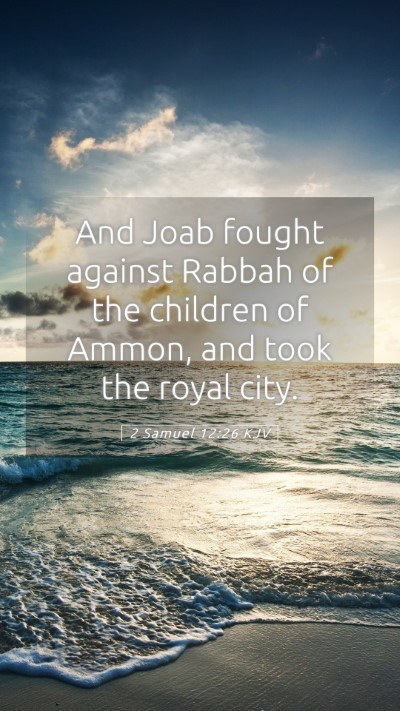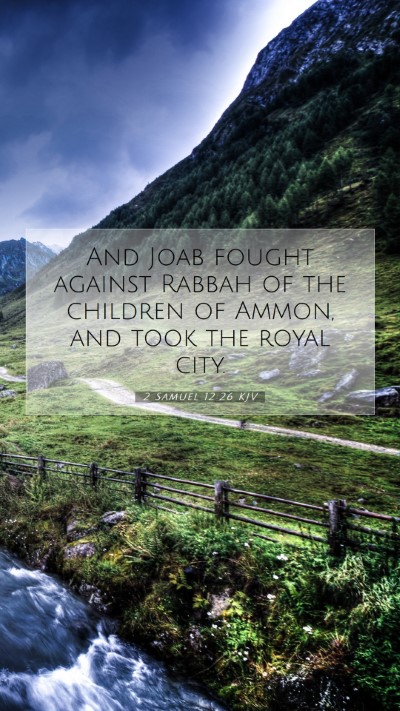Understanding 2 Samuel 12:26 - Bible Verse Meaning and Commentary
Verse Reference: 2 Samuel 12:26
Scripture: "And Joab fought against Rabbah of the children of Ammon, and took the royal city."
Overview of 2 Samuel 12:26
This verse highlights the military actions of Joab, King David's commander, as he lays siege against the city of Rabbah, the capital of the Ammonites. This incident occurs after the confrontation between David and Nathan the prophet concerning Bathsheba and Uriah, emphasizing the themes of sin, repentance, and restoration in the larger narrative of David's reign.
Commentary from Public Domain Sources
Matthew Henry's Commentary
Matthew Henry points out that Joab’s actions are significant not only militarily but also in the context of God's covenant with David. The siege demonstrates God's ongoing support for David despite his failings. Henry emphasizes that throughout the story of David, we see God's providence working through human actions, and Joab’s success here reinforces God's promise to establish David's throne.
Adam Clarke's Commentary
Adam Clarke elaborates on Joab's leadership qualities, noting his bravery and tactical prowess in leading the Israelites against Rabbah. Clarke describes Joab as a man of great military skill and loyalty to David, suggesting that this operation against the Ammonites is a critical moment in the ongoing conflict. Joab’s conquest symbolizes the vindication of David’s rule and looks forward towards the establishment of peace in the land.
Albert Barnes' Commentary
Albert Barnes discusses the implications of this verse in the broader context of Israel’s struggles during David’s life. He explains that Joab’s capture of the royal city was not merely a military victory; it also represented divine favor. Barnes highlights the theological significance of the military campaigns in relation to God’s promised protection and victory for His people as part of the covenant relationship established with David.
Key Themes and Insights
- God’s Sovereignty: This passage reinforces the notion that God is in control of Israel's fate, using human actions to fulfill divine purposes.
- Conflict and Resolution: The military conflict against the Ammonites illustrates the ongoing struggles faced by the Israelites and God's provision for them in times of trouble.
- Leadership and Loyalty: Joab's character as a capable leader reflects the qualities necessary for successful governance and military leadership.
- Grace and Forgiveness: Contextually, this verse follows David's sin and emphasizes the grace extended by God despite human shortcomings.
Application of 2 Samuel 12:26
In applying the insights from this verse to modern life, we can reflect on the importance of leadership, accountability, and God's sovereignty. Just as Joab faced challenges in battle, individuals today might confront various struggles, knowing that divine assistance is available for those committed to their cause. Furthermore, the acknowledgment of God's forgiveness offers hope for new beginnings, even after personal failures.
Bible Verse Cross References
- 2 Samuel 10:1-19: This passage details earlier conflicts with the Ammonites, providing background to the siege on Rabbah.
- 1 Chronicles 20:1-3: This complements 2 Samuel 12:26, offering additional insight on the conquest of Rabbah.
- 2 Samuel 5:12: This verse discusses God establishing David as king, showing the continuity of God's promises throughout David's reign.
Conclusion
2 Samuel 12:26 serves as a poignant reminder of the intricate relationship between divine guidance and human action. The commentary from notable theologians enhances our understanding of this passage, providing insights into the themes of leadership, conflict, and God's faithfulness both historically and in personal application.
For those engaged in Bible study groups, this verse offers fertile ground for discussion on themes of leadership and divine favor. Utilizing Bible study guides can help deepen one’s Bible verse understanding and interpretations. Engaging in online Bible study about such passages can lead to enriched insights and community growth in faith.


